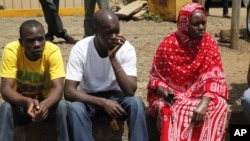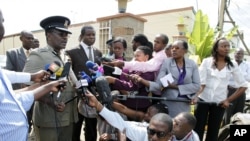NAIROBI —
Officials in Kenya now say at least 42 police officers were killed in an ambush Saturday, as more bodies have been recovered. Police believe cattle rustlers were behind one of the most shocking attacks in the country’s modern history.
Family members of the slain police officers waited at Wilson Airport in Nairobi Tuesday for the bodies to be returned, four days after the ambush in Samburu County.
The long, anxious wait has added insult to grief, particularly to Muslims here who say their religion requires them to bury the bodies as soon as possible.
Harun Mohammed Yusuf, whose cousin was among those killed, says the government has failed at every step.
“And we are worried about the capacity of the government and whether it was negligence or whether it is a sheer failure of logistics," Yusuf said. "Because if the government was not capable of equipping its soldiers to defend its community and its people, does it mean it does not even have the capacity to lift the dead?
Police entered into an area known as the Suguta Valley by truck Saturday ahead of an operation to recover stolen animals. But officials say the gunmen were waiting in the hills, and overpowered the security forces with automatic weapons.
In addition to those killed, at least nine other police officers were injured, while several others are still unaccounted for.
Violence over resources in Kenya’s remote regions is not uncommon, but an attack on government forces of this magnitude is nothing short of shocking.
Police spokesman Eric Kiraithe, speaking to reporters at Wilson Airport, said police will resume their hunt for those responsible.
“The search and rescue will continue until we are very, very satisfied that the area has been thoroughly covered and then the operation will continue because by any means and by any circumstances, the perpetrators of this kind of action can not be left to go unpunished,” he said.
At the heart of the violence is an ongoing conflict between the pastoralist Turkana and Samburu people.
Police were pursuing heavily-armed Turkana cattle rustlers, who are said to have led the ambush.
Abdullahi Halakhe, a Kenya researcher at the International Crisis Group, says the problem is that for too long, the government has had little presence in the area.
“There is an absence of state," he said. "So there is an ungoverned space there, which is a carryover from the colonial era where the pastoralist communities, or areas where the pastoralists were occupying, were never considered economically viable and as such the government never invested.”
He says that has all changed since the discovery of oil in the area, which is forcing the government to reconsider its relationship with the Turkana people.
While the weekend assault will likely set back efforts to re-engage, Halakhe said the government should avoid responding with more violence.
“This is not a very responsible government, particularly the security apparatus, so we have to monitor how they will react," he said. "I'm not sitting here and saying, you know, these guys should be handled with kid gloves. But at the same time, there should be a proportional response, it should be within the law.”
The attack also raises concerns about Kenya’s ability to control violence that could arise around the time of the presidential election in March. More than 1,100 people were killed in post-election violence after the last poll in 2007.
Family members of the slain police officers waited at Wilson Airport in Nairobi Tuesday for the bodies to be returned, four days after the ambush in Samburu County.
The long, anxious wait has added insult to grief, particularly to Muslims here who say their religion requires them to bury the bodies as soon as possible.
Harun Mohammed Yusuf, whose cousin was among those killed, says the government has failed at every step.
“And we are worried about the capacity of the government and whether it was negligence or whether it is a sheer failure of logistics," Yusuf said. "Because if the government was not capable of equipping its soldiers to defend its community and its people, does it mean it does not even have the capacity to lift the dead?
Police entered into an area known as the Suguta Valley by truck Saturday ahead of an operation to recover stolen animals. But officials say the gunmen were waiting in the hills, and overpowered the security forces with automatic weapons.
In addition to those killed, at least nine other police officers were injured, while several others are still unaccounted for.
Violence over resources in Kenya’s remote regions is not uncommon, but an attack on government forces of this magnitude is nothing short of shocking.
Police spokesman Eric Kiraithe, speaking to reporters at Wilson Airport, said police will resume their hunt for those responsible.
“The search and rescue will continue until we are very, very satisfied that the area has been thoroughly covered and then the operation will continue because by any means and by any circumstances, the perpetrators of this kind of action can not be left to go unpunished,” he said.
At the heart of the violence is an ongoing conflict between the pastoralist Turkana and Samburu people.
Police were pursuing heavily-armed Turkana cattle rustlers, who are said to have led the ambush.
Abdullahi Halakhe, a Kenya researcher at the International Crisis Group, says the problem is that for too long, the government has had little presence in the area.
“There is an absence of state," he said. "So there is an ungoverned space there, which is a carryover from the colonial era where the pastoralist communities, or areas where the pastoralists were occupying, were never considered economically viable and as such the government never invested.”
He says that has all changed since the discovery of oil in the area, which is forcing the government to reconsider its relationship with the Turkana people.
While the weekend assault will likely set back efforts to re-engage, Halakhe said the government should avoid responding with more violence.
“This is not a very responsible government, particularly the security apparatus, so we have to monitor how they will react," he said. "I'm not sitting here and saying, you know, these guys should be handled with kid gloves. But at the same time, there should be a proportional response, it should be within the law.”
The attack also raises concerns about Kenya’s ability to control violence that could arise around the time of the presidential election in March. More than 1,100 people were killed in post-election violence after the last poll in 2007.





